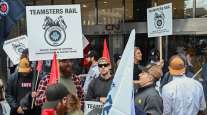UPS, Teamsters to Reopen Talks to Complete Parcel, Freight Pacts
This story appears in the July 1 print edition of Transport Topics.
The Teamsters union and UPS Inc. said they are resuming talks on rejected supplemental agreements to a master contract for the Package division that won rank-and-file approval last week, and the two are trying to reach a new tentative deal for workers in UPS’ Freight division.
Seventeen of the 35 supplemental agreements, or riders, for the Package unit were rejected on health care grounds, according to the union, potentially impacting the Aug. 1 effective date for the new five-year contract covering about 235,000 full- and part-time Package division workers.
Update: UPS, Teamsters agreed to extend current contract while supplements are being negotiated.
About 53% of union voters backed the master contract, the Teamsters said on June 26. Details about follow-up talks weren’t available as Transport Topics went to press.
In the Freight division, workers at the UPS less-than-truckload unit rejected by a 2-1 margin the tentative agreement negotiated by union leaders and management.
Meanwhile, in contract talks with a different company, the union is counting ballots on a tentative five-year LTL agreement between about 7,500 Teamsters and ABF Freight System Inc., a unit of Arkansas Best Corp. UPS and the Teamsters reached their tentative agreement in April. The ABF tentative agreement was announced in May and followed two extensions beyond the initial March 31 expiration date.
The UPS contracts with workers in Package and Freight expire on July 31 and are set to be supplanted by an agreement stretching to July 31, 2018. The Package contract offered a $3.90-per-hour wage increase, while the LTL Freight unit’s 12,000 union workers would have been paid an additional $2.50 per hour.
John McDevitt, senior vice president at UPS, tried to reassure customers in a June 25 statement: “It will be ‘business as usual’ while UPS and the IBT resolve remaining issues and Teamster-represented employees ratify new agreements.”
“UPS is committed to quickly resolving remaining issues on UPS Freight and supplemental agreements,” a UPS statement said. “This is part of the normal negotiating process, and UPS is confident that these contracts will be resolved soon.”
The 35 riders and supplements to the master agreement covered local contract provisions such as seniority rules and pensions, or specialized job functions. Some riders and supplements have failed in the past, including several in the current agreement.
A June 25 union statement indicated that a change in health-care coverage prompted rejections of the failed side agreements.
“A provision that moves 140,000 members from a company-sponsored health insurance plan into a plan that is jointly trusteed by employers and the Teamsters union contributed to some of the supplements being rejected,” the Teamsters’ statement said.
In addition to the wage increase, the Package contract includes provisions to create 2,350 new full-time jobs, options for workers to limit their hours, pension enhancements, new protections against harassment and no health-care premium contributions.
The Freight agreement (other than its wage increase differential) contains similar pension provisions and limits on subcontracting of work.
The agreement between the Teamsters and ABF calls for an initial 7% wage reduction — and eventual return to current wage levels during a five-year agreement. The union agreed to the ABF wage reductions to help the company restore profitability following more than $250 million in losses since 2009.
UPS Freight workers approved their initial contract with the company in 2008. The rejection of the UPS Freight agreement was the first time a contract has been turned down by union members since 1997, when the Independent Pilots Association rejected a deal.
In that same year, UPS Teamsters went on strike for more than two weeks, lowering company profit by $350 million. After that experience, the sides moved up their contract negotiating timetable and reached a 2002 contract without any disruption. That approach was repeated in a 2007 deal as well as for this round of talks, which began in December, to allow adequate negotiating time.
Article XII, Section 2 of the Teamsters’ constitution lays out the required process for handling the rejected UPS riders and supplements.
It says negotiators of the supplemental and master agreements must meet to come up with new proposals.
When a rider or supplement is rejected, there must be a new vote on the revised proposal by those eligible to vote on the rejected agreement. A third vote must be taken if any riders and supplements are rejected again. The union can’t carry out a strike authorization vote until after riders and supplements are rejected a total of three times.
Analysts said further negotiations may not help improve the contracts from the union’s standpoint.
“We do not expect the Teamsters to materially improve the current agreement and expect UPS to realize wage cost savings in its new contract,” said a report from Justin Yagerman, a Deutsche Bank analyst.




